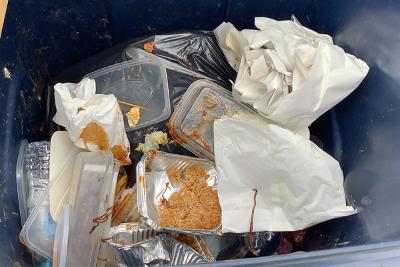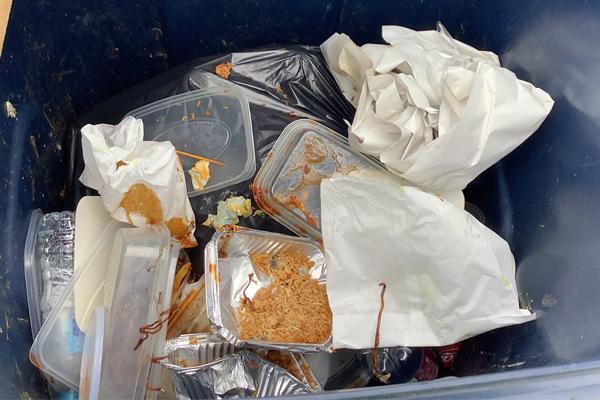Please recycle responsibly - recycling contamination is approaching unsustainable levels

Only place items that can be recycled in your blue recycling bin. This is the strong message we are sending to residents as the level of contamination in recycling bins continues to rise.
As well as putting bottles, cans, paper, cardboard, and other recyclable materials in their recycling bins, some residents are putting in black bags and carrier bags, soiled nappies, food waste, greasy takeaway boxes and containers, and full bottles of liquids, contaminating either the whole bin, or sometimes an entire lorry load, and rendering tonnes of recyclable materials unusable.
Prior to the Covid-19 pandemic approximately 13% of the recycling we collected annually was contaminated. However, this increased to 16% in 2020, and to nearly 22% in 2021, resulting in over 3,500 tonnes of potentially recyclable items being wasted.
Marc Morley, Service Director for Highways and Waste, says the increasing amount of contamination is only harming local residents.
"The Council has to pay for the disposal of contaminated recyclable loads. At the current rate of close to 22%, this will cost us close to £400,000. These are funds that could otherwise be spent on other important local services.
"We implore Gateshead's residents to work with us in driving down the current contamination rate. If we don't, our bin collection crews must increasingly refuse to empty recycling bins that have obviously been contaminated by the householder until the non-recyclable materials have been disposed of correctly."
Residents can recycle glass bottles, plastic bottles, pots, tubs and trays, cans, aerosols, paper, cardboard and beverage cartons amongst other items, in their blue recycling bins. Please place all items in loosely and not inside one another. Do not use any plastic bags. Newspapers and magazines should be recycled separately in the inner caddy. All recycling should be clean and dry, free from food residue or liquid.
Other materials such as textiles, shoes, electrical goods, batteries, motor oil, gardening waste, and larger plastic objects such as children's toys and garden furniture, should be recycled at one of the Council's Household Waste and Recycling Centres.
All food and unsanitary waste must be disposed of in your household waste bin.
Visit our A to Z of recycling for a full list of what can and can't be recycled.

Only place items that can be recycled in your blue recycling bin. This is the strong message we are sending to residents as the level of contamination in recycling bins continues to rise.
As well as putting bottles, cans, paper, cardboard, and other recyclable materials in their recycling bins, some residents are putting in black bags and carrier bags, soiled nappies, food waste, greasy takeaway boxes and containers, and full bottles of liquids, contaminating either the whole bin, or sometimes an entire lorry load, and rendering tonnes of recyclable materials unusable.
Prior to the Covid-19 pandemic approximately 13% of the recycling we collected annually was contaminated. However, this increased to 16% in 2020, and to nearly 22% in 2021, resulting in over 3,500 tonnes of potentially recyclable items being wasted.
Marc Morley, Service Director for Highways and Waste, says the increasing amount of contamination is only harming local residents.
"The Council has to pay for the disposal of contaminated recyclable loads. At the current rate of close to 22%, this will cost us close to £400,000. These are funds that could otherwise be spent on other important local services.
"We implore Gateshead's residents to work with us in driving down the current contamination rate. If we don't, our bin collection crews must increasingly refuse to empty recycling bins that have obviously been contaminated by the householder until the non-recyclable materials have been disposed of correctly."
Residents can recycle glass bottles, plastic bottles, pots, tubs and trays, cans, aerosols, paper, cardboard and beverage cartons amongst other items, in their blue recycling bins. Please place all items in loosely and not inside one another. Do not use any plastic bags. Newspapers and magazines should be recycled separately in the inner caddy. All recycling should be clean and dry, free from food residue or liquid.
Other materials such as textiles, shoes, electrical goods, batteries, motor oil, gardening waste, and larger plastic objects such as children's toys and garden furniture, should be recycled at one of the Council's Household Waste and Recycling Centres.
All food and unsanitary waste must be disposed of in your household waste bin.
Visit our A to Z of recycling for a full list of what can and can't be recycled.
